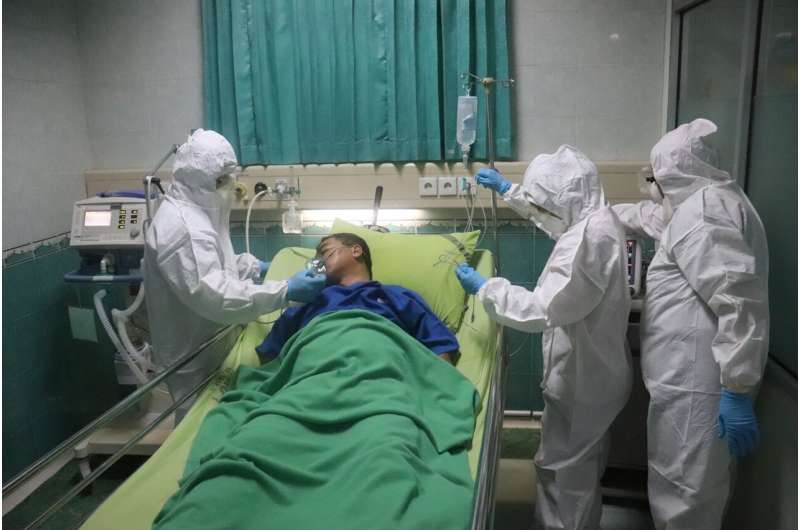This article has been reviewed according to Science X's editorial process and policies. Editors have highlighted the following attributes while ensuring the content's credibility:
fact-checked
trusted source
proofread
The lasting impact of ICU stays during COVID-19 pandemic

Anyone who's had a family member in the intensive care unit knows how worrisome and stressful that can be. For those who can't visit their loved one, such as during the COVID-19 pandemic, the situation is even more distressing.
RUSH pulmonary and critical care physician Jared Greenberg, MD, spearheaded a study to learn more about what families of patients with COVID-19 went through during and after an ICU stay, especially when it came to their mental health. Results were published in Annals of the American Thoracic Society.
"We really wanted to have a better understanding of what families were experiencing on the emotional level," Greenberg said. "Having this understanding will help inform the care we provide during and after an ICU stay."
Grief complicates family dynamics
Greenberg and the other authors surveyed and interviewed loved ones of COVID-19 patients who were hospitalized in the RUSH ICU during the early phases of the pandemic. Of those patients, about half ultimately died from COVID-19.
Not surprisingly, family members of the ICU patients who died from COVID-19 reported greater levels of anxiety, depression and post-traumatic stress disorder symptoms than family members of patients who survived. The researchers studied how the family members viewed the experience, how they felt about their role and the role other loved ones played in the patient's care, and where they found support.
Families of patients who died often viewed family and friends as a source of stress, whereas families of surviving patients viewed their community as a source of support, Greenberg said.
"Having a loved one die from COVID-19 in the ICU completely changed the family dynamics after the ICU stay," Greenberg said. "Family members sometimes blamed people within their support network for not advocating more for the patient while they were still alive. Others purposely avoided contact with other family and friends. It was a very stressful experience and is something that should be more widely acknowledged. A lot of these families need ongoing support."
Families of surviving patients had a very different experience: They reported feeling like they received instrumental emotional support from their family and friends after the ICU stay. These participants reported that being around others helped their loved one continue to recover from COVID-19 after the ICU stay.
Virtual support can't beat physical presence
Technology greatly helped bridge the communication gap and allowed families to stay in touch with their loved one, Greenberg pointed out. However, the use of video calls was not enough for families experiencing symptoms of PTSD after the ICU stay.
"Families of patients who passed away felt like they missed opportunities to directly witness the patient's care in the ICU and make decisions with the patient as events were unfolding," Greenberg said. "They would have felt more at peace with their loss if they had physically been there with the patient."
Coping with loss after an ICU stay
Greenberg said part of the way a family handles or processes a loved one's death in the ICU is by witnessing the care they receive. When they don't get to see it firsthand, it can lead to guessing and ruminating on the past. This brings up feelings of regret, which can cause a lot of stress and can prevent people from moving forward in a healthy way.
"I would consider an ICU experience for the family, especially one that ends with death, as a traumatic event—like being involved in a car accident or a military service experience," Greenberg said.
Crystal M. Glover, Ph.D., is an applied social psychologist and mixed methodologist in the RUSH Alzheimer's Disease Center and one of the study's co-authors. She says feelings of depression, stress or anxiety are normal after experiencing or handling a loved one's ICU stay.
"Having a family member in the ICU is a major psychological and emotional event for families and extended family members," Glover said. "As a society, we severely underestimated the role physical presence can play in feelings of isolation."
Glover says having people you trust to talk with is crucial to starting the healing process. She recommends reaching out to trusted family, friends or extended networks to talk about how you're feeling.
"The pandemic was collectively traumatic, but physical connection is way more important than many patients and families realized."
Managing mental health
Greenberg said he hopes the study results will raise awareness of how emotionally distressing it is for families with loved ones in the ICU, especially when they cannot be with them.
"We have to do a better job of helping people understand that an ICU experience can be traumatic. When families understand they're going through a traumatic event, they may be more aware that they need to seek out help."
In the long term, Greenberg and Glover hope the study will help establish specific resources to support people going through this type of traumatic event.
More information: Kalli A. Sarigiannis et al, Symptoms of Anxiety, Depression, and Stress among Families of Critically Ill Patients with COVID-19: A Longitudinal Clinical Trial, Annals of the American Thoracic Society (2023). DOI: 10.1513/AnnalsATS.202209-797OC




















